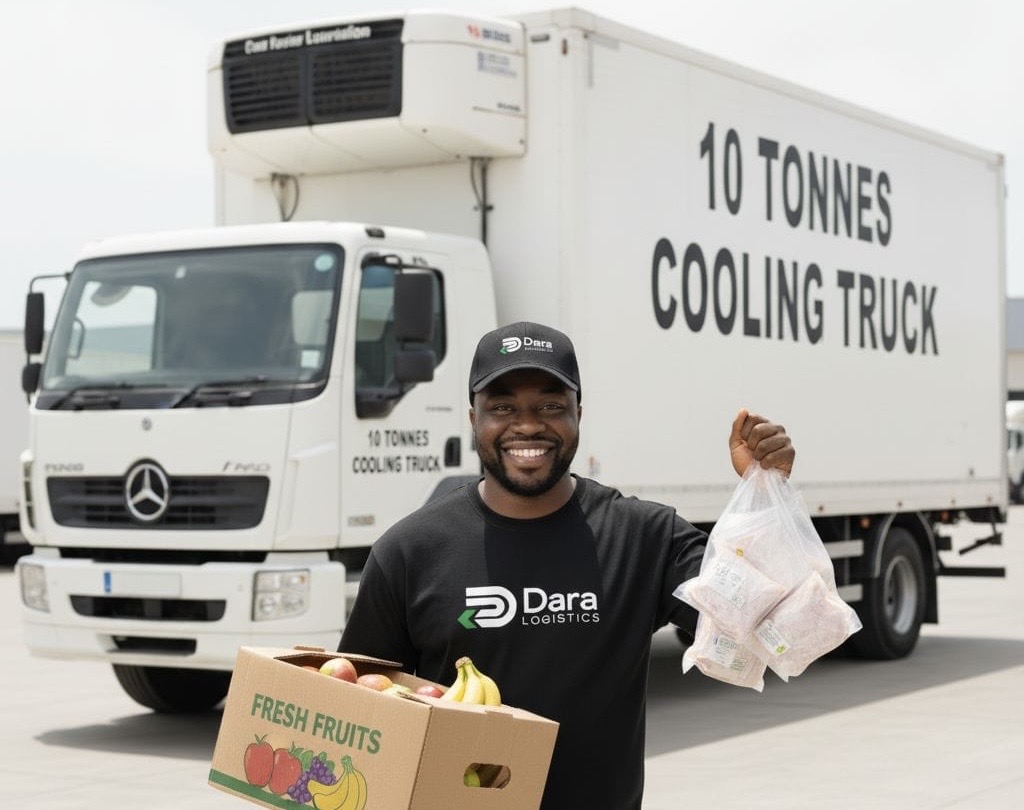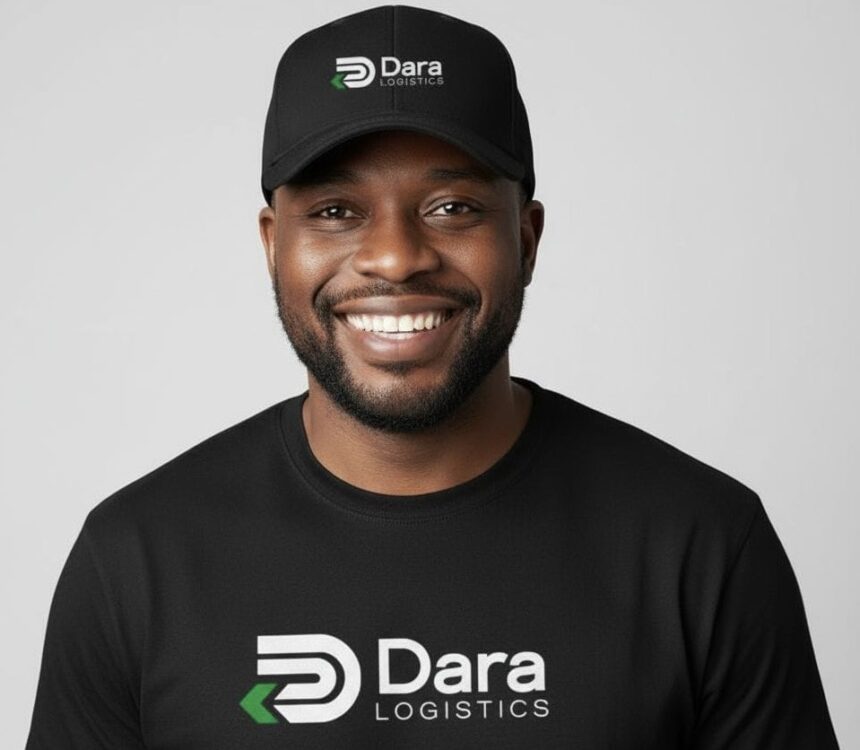Across Nigeria, poor temperature control, unreliable trucks, unstable storage, and opaque logistics systems have made cold chain delivery one of the country’s most underdeveloped yet essential supply chains. Dara, a cold logistics startup, is setting out to change that.
And the company is doing it with a combination of technology, smart partnerships, and a deep understanding of African operating realities.
In this edition of Techparley’s DRIVE100, where we spotlight Africa’s most promising and transformative startups, we turn our attention to Dara, led by Kelvin Iyayi, which is building a reliable, tech-powered cold chain network for Nigeria’s food and pharmaceutical industries.
“Dara solves the challenge of inefficient cold chain logistics across Nigeria — a problem that affects producers, distributors, and retailers of perishable goods and pharmaceuticals,” Iyayi told Techparley.
Solving Nigeria’s Cold Chain Crisis
Every stakeholder in Nigeria’s perishable goods sector, from poultry farmers and frozen food distributors to pharmaceutical companies suffers from one persistent problem: the lack of a reliable cold chain.
Inefficient cooling systems, frequent power failures, and inconsistent delivery schedules mean that businesses often absorb heavy losses. According to Iyayi, the consequences go far beyond business margins. They affect food security, healthcare standards, and consumer trust.
“Many businesses lose millions annually due to poor temperature control, unreliable delivery schedules, and lack of transparent logistics infrastructure. This affects food security, healthcare supply chains, and overall consumer trust. Dara was built to fix that,” he said.
How Dara Works
Dara provides temperature-controlled logistics designed specifically for perishables and sensitive goods. But unlike traditional operators, Dara’s backbone is technology.
According to the startup, its key features include:
- GPS-tracked refrigerated trucks with real-time temperature monitoring
- Nationwide and cross-border delivery for pharmaceuticals, frozen foods, fresh produce, and more
- On-demand and subscription-based delivery services
- Cold storage and warehousing for short- and long-term needs
- Supply chain analysis and optimisation tools for partner businesses
Iyayi noted that the benefits for businesses includes reduced spoilage and wastage, improved operational efficiency, real-time visibility and transparency, and cost-effective logistics for SMEs and large corporations.

Where traditional cold chain operators focus solely on transportation, Dara takes a holistic, technology-driven approach, integrating IoT monitoring, predictive analytics, and customer dashboards.
What Makes Dara Different
Iyayi describes the company’s unique value proposition as “Reliable, tech-powered cold chain delivery built for Africa’s climate and business realities.”
The cold logistics space in Nigeria already has players such as Koolboks Logistics, TempSafe, and ColdChain Logistics Ltd. But Dara differentiates itself by offering smart route optimisation, IoT-enabled fleet management, customer-facing transparency tools, and data analytics that empower better decision-making
In a sector where trust is scarce, observers say Dara is intentionally building an ecosystem around reliability.
Early Signals of a Scalable Operation
In just months of structured operations, Dara has achieved milestones that reflect both capability and demand.
Key Milestones
- Completed its MVP website and client dashboard at daraexpress.com
- Onboarded 8+ paying clients in pharmaceuticals, frozen foods, and fresh produce
- Partnered with independent cold truck owners in Lagos and Port Harcourt
- Achieved a 90% on-time delivery rate
- Successfully transported ₦25 million+ worth of temperature-sensitive goods
- Launched the Dara Fleet Partner Programme (DFPP) to expand national coverage
For a sector often bogged down by poor infrastructure, Dara’s early consistency is notable, and suggests a model capable of scale.
The Team Behind Dara’s Vision
Behind Dara is a founding team whose expertise cuts across engineering, logistics, and business development.
- Kelvin Iyayi, Founder & CEO: An engineer and product manager with a track record in logistics tech, SaaS development, and product design. He has previously built and scaled tech-driven logistics products.
- Pelumi, Business Development Lead: Skilled in client acquisition and growth strategy for mobility and logistics startups.
- Festus, Operations & Fleet Manager: Brings over 10 years of experience managing fleet operations and cold storage systems in Nigeria’s logistics industry.
Iyayi emphasises that their complementary strengths position them uniquely to solve Africa’s cold chain challenges.
Challenges and How Dara is Solving Them
Cold chain logistics is notoriously expensive and infrastructure-heavy. Nigeria adds its own complications: unstable power supply, high truck acquisition cost, and fragmented logistics data.
Dara is navigating these hurdles through:
- Partnerships with independent fleet owners to reduce capital expenditure
- Solar-assisted cold storage solutions
- In-house logistics data systems for predictive and real-time decision-making
Rather than simply work around the constraints, Dara is engineering solutions that are sustainable and scalable.
The Road Ahead
Dara’s short- and long-term ambitions are bold. It wants to build West Africa’s largest tech-powered cold logistics network, establish a network of Dara Cold Hubs across Nigeria, and become Africa’s leading cold logistics infrastructure company.
Iyayi sees Dara not just as a logistics company, but as a backbone for Africa’s food and healthcare systems.
Iyayi also believes government support can accelerate innovation in cold logistics. If he were the Minister of Communications, Innovation and Digital Economy, he says he would push data-driven policy, public-private collaboration, and the digitisation of logistics frameworks.
For Iyayi, the continent’s biggest tech challenge is not talent or innovation but lack of infrastructure and inconsistent access to growth capital.
“Many brilliant ideas die early because the environment doesn’t support scale,” he said.
According to him, this is precisely the gap Dara hopes to fill, starting with cold chain logistics, one of the continent’s most critical and underserved infrastructures.
Talking Points
It is remarkable that Dara is tackling one of Nigeria’s most persistent structural problems with a tech-enabled approach that blends transparency, real-time monitoring, and temperature-controlled delivery.
By equipping cold trucks with GPS tracking, IoT sensors, and live temperature visibility, Dara addresses a major pain point for businesses that deal in perishables: the uncertainty and opacity that often lead to spoilage, losses, and broken trust.
This single shift toward transparency positions Dara as a practical, high-impact solution for industries where timing and temperature are non-negotiable, especially for pharmaceutical distributors, frozen food suppliers, and fresh produce merchants.
At Techparley, we recognise how solutions like this can strengthen Nigeria’s food and healthcare systems, reduce wastage, and improve supply chain reliability across both urban centres and underserved regions.
As Dara expands, there is room for alliances with food producers, pharmaceutical importers, agro-export companies, and government agencies. Such partnerships could accelerate adoption, deepen nationwide coverage, and position Dara as a backbone for West Africa’s temperature-sensitive supply chains.
——————-
Bookmark Techparley.com for the most insightful technology news from the African continent.
Follow us on Twitter @Techparleynews, on Facebook at Techparley Africa, on LinkedIn at Techparley Africa, or on Instagram at Techparleynews.






